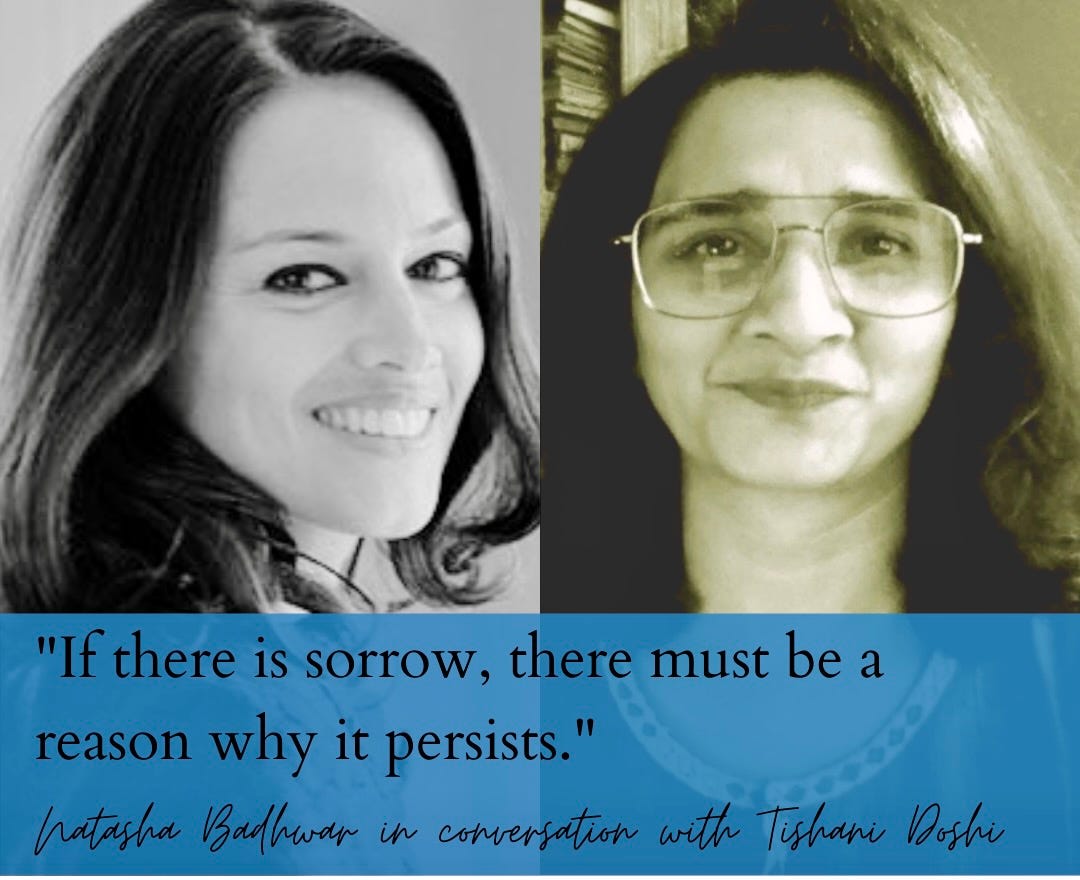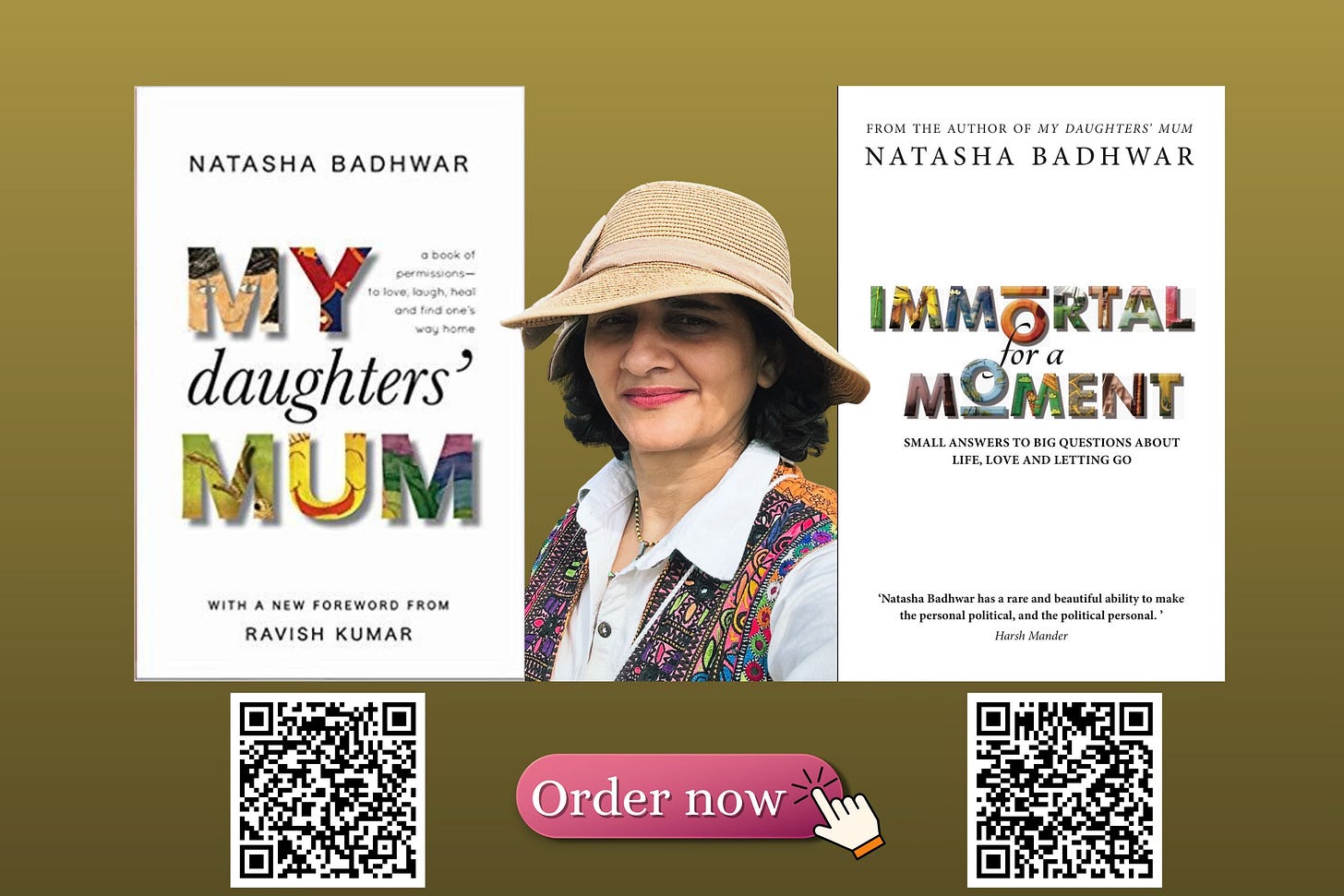Depression forced me to name my purpose
A conversation with poet and dancer, Tishani Doshi about reclaiming the inner artist, breaking down hierarchies and occasionally getting away with broken grammar.
“Once you deep-dive into solitude and discover the richness of your inner life, you find that your own anchor is forever within you. It will remain my place of calm and coherence.”
Natasha Badhwar’s collection of essays, My Daughters’ Mum and Immortal For A Moment, is a wide-ranging journey into motherhood, friendship, wandering, and ultimately, being human.
A filmmaker, photographer and writer, with a long career in broadcast journalism, Badhwar’s interests are eclectic: to reclaim the inner artist, to break down hierarchies, to occasionally get away with broken grammar. In this conversation we talk about the power of stories and whether happiness is overrated, about children — imaginary and real — about solitude and technology, and how Rajesh Khanna songs of the ‘60s might just be the thing to shake away those blues…
Tishani: “I like my happiness in small doses,” you say. You jumped off a roof when you were twelve. You write about depression and feeling low, but you also come across as cheerful and zany. Is happiness overrated?
Natasha: When I zoom out and look at the design of modern urban lives, happiness seems to be quite underrated, actually. It's the one thing we are forever postponing as we nervously train ourselves to become disciplined, useful and employable people, never quite sure when it is okay to just be. To do nothing, to recover from being tired and anxious. We also confuse happiness with the acquisition of things. Like I write in the book, an important lesson of life is that there is no ‘formula’ for happiness — “not love, not success, not children and not even pasta. Picking guavas off the tree comes pretty close. If there is sorrow, there must be a reason why it persists. Let me not mess with it too much. There’s a wiser, quieter, happier me lurking within. I must let her lead the way. Happiness is a decision. It is an innate need, a survival strategy. I must be happy despite the onslaught of reality. I must hold on to joy in defiance of the ugly world that surrounds us.”
Tishani: Rural India versus Urban India. You’ve occupied both these spaces. Is there such a thing as the real India, and if so where does it reside?
Natasha: All these Indias are real, including the spaces we’d rather not look too closely at — the crossroads where caste, gender and class violence takes place. Where the worst inequalities exist. I find that my personal choices constantly take me close to this intersection. I look for ways to confront it, to understand and reveal it. To search for empathy and humanity, so that I can renew my own pact with life.
Tishani: I’ve always been interested in this passage by Alice Munro: “They spoke of calling attention. Calling attention to yourself. The opposite of which was not exactly modesty but a strenuous dignity and control, a sort of refusal. The refusal to feel any need to turn your life into a story, either for other people or for yourself.” She was talking about her family here…. most writers face a similar kind of familial backlash for using the material of their life as grist. Thoughts on how you’ve overcome this with panache?
Natasha: I tell stories to separate the grains of truth from the chaff of lies that everyday life is. My inner life and my lived experience seek expression, and the more I go along as a writer and photographer, the calmer I feel. There’s a lot that we learn to overcome throughout life, simply so that we may learn to live on our own terms. We might as well do it with panache. That’s where my happiness lies. In the comedy, the flair and the acting out of the joy that I exist. I tell stories. I am the story.
Tishani: I don’t have children, but I always imagined if I did, I would have daughters. But when you already have children can you imagine other children in abstraction? Another daughter, or a son?
Natasha: I have also always imagined having children. I love babies. And young adults in their 20s, which is like a second babyhood. It’s an effort for me to not get too invested or meddlesome with them. Now that our children are all close to adolescence, I often find my mind making plans about how to get my baby fix when they are all grown up and independent. You know, Tishani, it is easier to imagine another child or new pets, just like it is always less complicated to plan the travels than moving. It’s much harder to sustain love and focus on what is already there. That takes creativity. This is where storytelling comes to our rescue. It helps to see anew. It shows us connections that we have missed in the whirl of living.
Every time I revisit and unravel something so I can reach its core, I find that I have renewed my understanding of myself and those who are in the story. I have solved a problem or untied a tight knot. Often my readers guide me, showing me how to take the final few steps. That is the greatest gift.
Tishani: Two words come up a lot — vulnerability and intimacy. Can you talk about the importance of these states, and what you think the effects of technology (another word you use a lot) might have on them?
Natasha: I suspect that because depression visited me when I was very young, I have had a lot of time to wade through its fog. Sometimes one can stay on one’s balcony and even admire the misty beauty of it, at other times, one has to reach elsewhere and one ventures out, tentatively, despite zero visibility. It can paralyse us, it puts us at risk. But it also forces us to evaluate what is really necessary. To learn to negotiate what one fears. To name one’s purpose. I realise that intimacy is the fuel, the life-force that sustains us. Sure, it makes us vulnerable, but that is also what makes us humane. What makes us step back from our ability for violence and self-destruction. I’m not kind or tender without effort. I steer myself towards softness and vulnerability by choice. By force, even. It’s the only space from where I can nurture with honesty and humility. Technology has always been a double-edged sword. It has enabled us to travel and communicate, and it has also given us weapons and fake news. It is our responsibility to step back from the mindless power that technology and privilege hand to us. Again, this is part of our essential humanity. I feel that it is our role as artists and mentors to call out the mindless surrender to tech addiction.
Tishani: What does solitude mean to you?
Natasha: There was the aloneness of my teenage years when I’d be on my own while my brothers were playing a sport or studying for entrance exams. I would be learning melodious, melancholic songs from Rajesh Khanna films of the ‘60s and conjuring stories about my imaginary family, the members of which were so many and so varied that I had eventually created a whole neighbourhood and given everyone a backstory too. I suppose it was a kind of creative solitude, sitting on the steps outside our third floor flat, looking out at dusk for my father’s car to emerge from the distance. In my mid-30s, I found myself at home with long swathes of alone-time after years of having been very busy, creative and always on the move. We had moved out of the city, away from my workplace, friends and extended family. My new life with young children in an unfamiliar suburb brought a stark sense of solitude with it. It took me a while to realise that having one’s own time and resources was an asset. That it was a goal to aspire for. “I once lived in a very ugly house. I took the best photos of my life in it,” I had written about that time.
This slow phase stripped me of my layers and became an opportunity to re-discover my voice and my courage. I developed an active relationship with colour, texture, light, plants and water. With the rhythm of words as they visited me. Eventually I realised that it wasn’t just meant to be an interlude. Once you deep-dive into solitude and discover the richness of your inner life, you find that your own anchor is forever within you. It will remain my place of calm and coherence.
This interview with Tishani Doshi was first published here in The Hindu: https://www.thehindu.com/thread/anything-but-books/natasha-badhwar-is-happiness-overrated/article22609428.ece








"reclaiming the inner artist, breaking down hierarchies and occasionally getting away with broken grammar..." Such powerful tools to liberation from self, especially for aspiring writers. I'm always learning something new from reading you, Natasha. Here's another gem, something that contradicted my own beliefs: "...happiness seems to be quite underrated, actually. It's the one thing we are forever postponing as we nervously train ourselves to become disciplined, useful and employable people, never quite sure when it is okay to just be. To do nothing, to recover from being tired and anxious. We also confuse happiness with the acquisition of things. Like I write in the book, an important lesson of life is that there is no ‘formula’ for happiness — “not love, not success, not children and not even pasta." BIIIIIIIIGGGGGG learning formula here :)
superb interview,given me a pause to rethink...